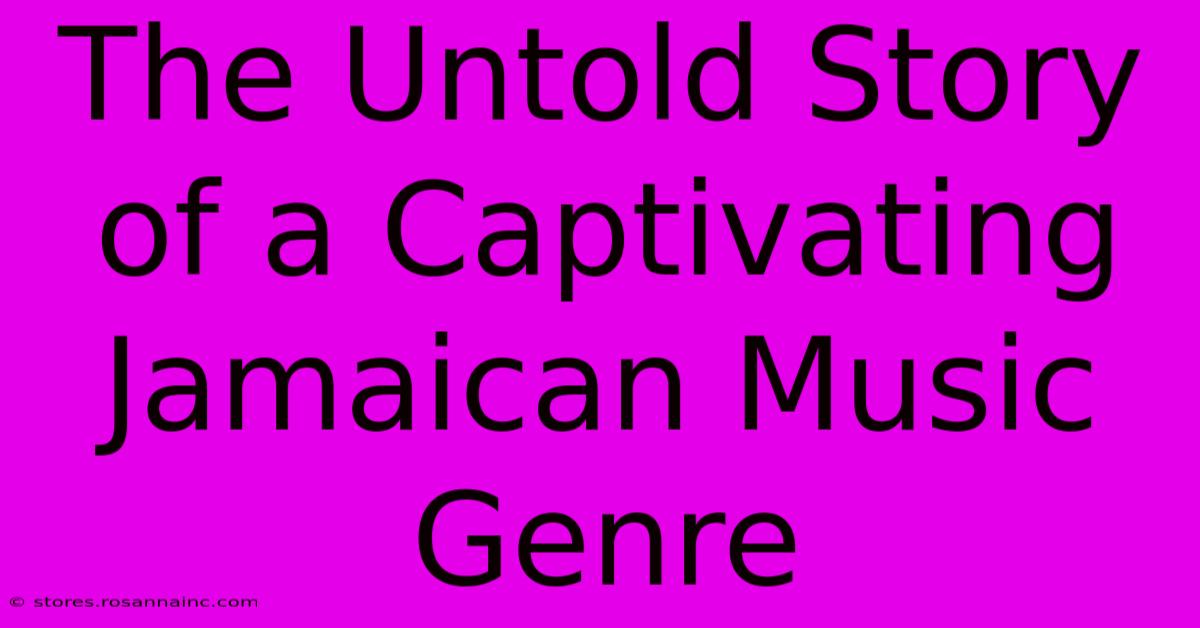The Untold Story Of A Captivating Jamaican Music Genre

Table of Contents
The Untold Story of a Captivating Jamaican Music Genre: Ska
Jamaica's musical landscape is rich and vibrant, a tapestry woven from diverse influences and infused with a unique island spirit. While reggae and dancehall often take center stage, another genre holds a crucial, often overlooked, place in this vibrant history: Ska. This article delves into the untold story of ska, exploring its origins, evolution, and lasting impact on global music.
Ska's Humble Beginnings: A Fusion of Sounds
Ska emerged in Jamaica during the late 1950s and early 1960s, a fascinating fusion of American rhythm and blues, jazz, and mento – a traditional Jamaican folk music characterized by its upbeat tempos and simple instrumentation. This unique blend created a sound that was both familiar and distinctly Jamaican. Early ska artists often used existing American R&B songs, adapting them with a Jamaican twist and adding a crucial element: the off-beat emphasis. This rhythmic innovation, a subtle yet powerful shift in the rhythm, would become a defining characteristic of the genre.
Key Players in Ska's Genesis
Several pioneers laid the groundwork for ska's explosive growth. The Skatalites, a legendary instrumental group, are widely considered the genre's house band, their intricate arrangements and polished sound shaping the ska aesthetic. Vocalists like Prince Buster and Owen Gray, with their distinctive vocal styles and often humorous lyrics, added another dimension to the emerging sound. These artists, along with countless others, fueled the early ska craze, establishing its place in Jamaican popular culture.
The Rise of Ska: Sound System Culture and International Appeal
Ska's popularity wasn't confined to the recording studio. It thrived in Jamaica's vibrant sound system culture, where mobile sound systems played music at dances and parties throughout the island. The booming basslines and infectious rhythms of ska provided the perfect soundtrack for these lively gatherings, cementing its place in the hearts and minds of Jamaicans.
The genre's influence, however, extended far beyond Jamaica's shores. By the mid-1960s, ska was finding its way into the UK, becoming a significant part of the burgeoning Mod scene. Its sharp rhythms and rebellious spirit resonated with the Mods, and ska soon became their anthem. This international recognition propelled ska into a global phenomenon, solidifying its place in music history.
Ska's Enduring Legacy: A Genre that Continues to Inspire
Despite its relatively brief initial period of popularity in the 60s, ska's influence remains undeniable. It laid the foundation for numerous subsequent Jamaican genres, notably rocksteady and reggae. The rhythmic innovations of ska, its distinctive instrumentation, and its rebellious spirit can be heard in countless songs and styles across diverse genres.
Ska's influence is evident in:
- Rocksteady: A slower, more soulful evolution of ska.
- Reggae: Reggae's roots are firmly planted in ska's rhythmic structure.
- 2 Tone Ska Revival: The resurgence of ska in the late 1970s and 1980s, bringing the genre to a new generation.
- Modern Ska Punk and Ska Core: The fusion of ska with punk and hardcore punk music.
Today, ska remains a vibrant and influential music genre. Its infectious rhythms and rebellious spirit continue to inspire musicians worldwide, proving that this seemingly simple musical form holds an enduring legacy. Its story is a testament to the power of musical fusion, the importance of cultural exchange, and the enduring appeal of a truly unique and captivating sound. So, next time you hear those distinctive off-beat rhythms, remember the untold story of ska – a captivating Jamaican genre that continues to resonate globally.

Thank you for visiting our website wich cover about The Untold Story Of A Captivating Jamaican Music Genre. We hope the information provided has been useful to you. Feel free to contact us if you have any questions or need further assistance. See you next time and dont miss to bookmark.
Featured Posts
-
Supporting Your Third Grader Age Appropriate Expectations
Feb 10, 2025
-
Blood On The Tracks Manga A Must Read For Thriller Fans
Feb 10, 2025
-
From Console To Cinema Need For Speed Pelicula
Feb 10, 2025
-
Last Minute Chivas Vs America Lineup Leaks And Insider Info
Feb 10, 2025
-
Feyenoord Vs Bayer Leverkusen Lineups Revealed Your Matchday Guide
Feb 10, 2025
